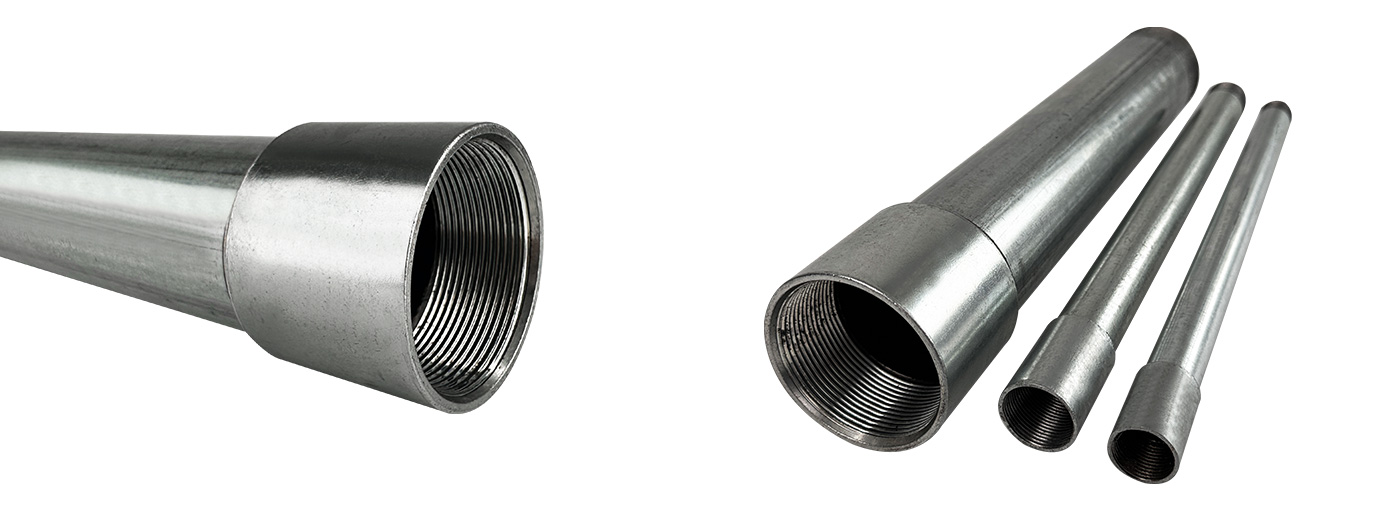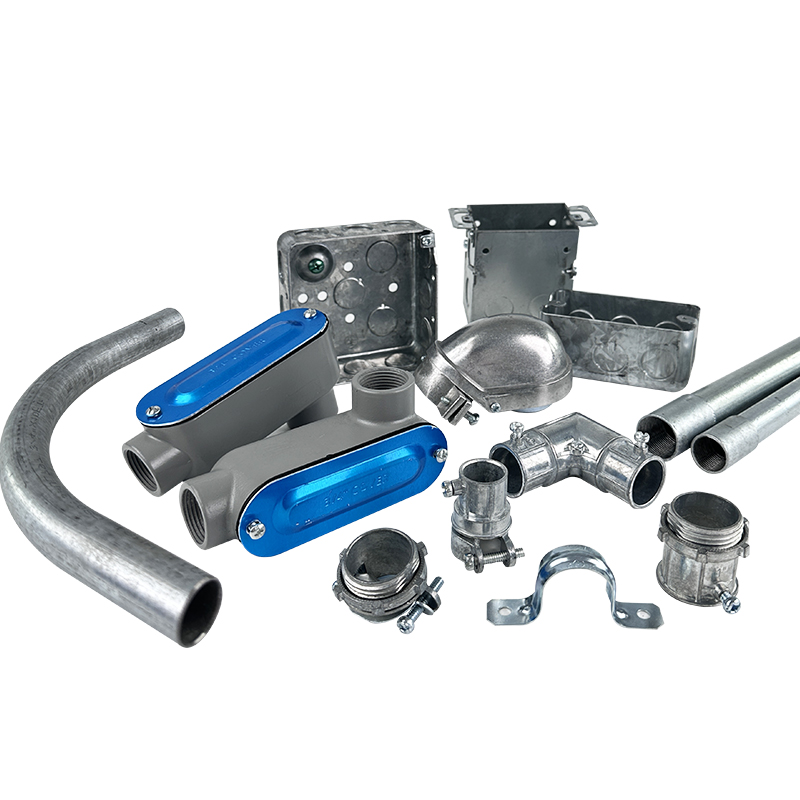What Is IMC Conduit? Complete Guide to Intermediate Metal Conduit and Fittings
Categories:EMT/IMC Conduit and Fitting Author: author
Whether you're wiring a shopping mall, setting up an industrial plant, or building an EV charging station, protecting electrical wiring is essential. Among the many conduit types available, Intermediate Metal Conduit (IMC) has become an important choice for contractors, engineers, and project managers.
We will take you through important things you need to know about IMC conduit—its materials, specifications, applications, fittings, and why working with a trusted manufacturer like ULP streamlines your project.
What Is IMC Conduit?
Intermediate Metal Conduit (IMC) is a steel electrical conduit designed to provide mechanical protection and grounding for electrical wiring. As the name suggests, it sits between EMT (Electrical Metallic Tubing) and RMC (Rigid Metal Conduit) in terms of wall thickness, weight, and strength.
● Material: IMC is made of high-strength carbon steel.
● Coating: It is hot-dip galvanized inside and outside for excellent corrosion resistance.
● Wall Thickness: Thicker than EMT but thinner than RMC, offering strength without excessive weight.
● Sizes: Typically range from 1/2 inch to 4 inches in diameter, covering most residential, commercial, and industrial wiring needs.
IMC Conduit vs. EMT, RMC, and PVC
Choosing the right conduit often comes down to the project's environment, budget, and installation needs. Here's how IMC compares:
|
Conduit Type |
Strength |
Weight |
Corrosion Resistance |
Cost |
Applications |
|
IMC |
High |
Medium |
Excellent (galvanized) |
Medium |
Commercial, industrial, outdoor |
|
EMT |
Medium |
Light |
Moderate |
Low |
Light commercial, residential |
|
RMC |
Very High |
Heavy |
Excellent |
High |
Heavy-duty, underground, high-security |
|
PVC |
Low |
Very Light |
Very High (non-metallic) |
Low |
Corrosive/chemical environments, non-load-bearing |
● Why choose IMC over EMT? IMC is stronger and suitable for locations where the conduit may be exposed to physical damage.
● Why choose IMC over RMC? IMC offers nearly the same protection but is lighter and easier to install, with a lower material cost.
● Why choose IMC over PVC? PVC is corrosion-proof but lacks mechanical strength; IMC is ideal when both strength and durability are required.
Common Applications of IMC Conduit
Because of its balance between protection and cost, IMC conduit is used across many sectors. Let's look at specific examples:
1. Commercial Buildings: Shopping malls use IMC in parking garages and service corridors, where wiring is exposed to potential impact. Office towers often specify IMC for mechanical rooms and fire pump control circuits, where wiring safety is critical.
2. Industrial Facilities: Manufacturing plants rely on IMC to protect wiring against vibration, forklift traffic, and harsh chemicals. In oil and gas facilities, IMC is often used in hazardous locations that require both mechanical strength and corrosion resistance.
3. Outdoor Projects: EV charging stations use IMC for underground feeder conduits and pedestal wiring to ensure long-term reliability. Municipal projects like street lighting or highway surveillance systems use IMC because it resists weathering and UV exposure.
4. Underground Installations: With proper sealing and fittings, IMC is commonly used for direct burial applications to protect electrical feeders from soil pressure and moisture intrusion.
IMC Conduit Fittings and Accessories
A conduit system is incomplete without the right fittings. IMC conduit fittings ensure mechanical stability, electrical continuity, and environmental protection.
● Couplings: Connect two lengths of IMC.
● Connectors: Secure conduit to junction boxes or enclosures.
● Elbows: Allow smooth directional changes without kinking wires.
● Straps and Clamps: Provide secure support to walls, ceilings, or machinery.
● Expansion Fittings: Absorb thermal expansion in outdoor runs.
High-quality fittings are essential not only for performance but also for code compliance. Inferior fittings can compromise grounding and increase the risk of failure.
Cost and Procurement Considerations
From a cost perspective, IMC conduit is often seen as the most economical steel conduit option when considering long-term performance.
● Initial Cost: More than EMT, but significantly less than RMC.
● Labor Cost: Easier to handle and install than RMC, reducing installation hours.
● Lifecycle Cost: Galvanized coating extends service life, lowering replacement and maintenance costs.
For large-scale projects, working with a reliable conduit and fittings manufacturer or supplier can reduce procurement costs through bulk ordering, OEM customization, and optimized logistics.
Why Choose ULP for Conduit and Pipe System Solutions?
Sourcing conduit and pipe systems is not just about buying products—it's about choosing a partner that understands your project needs. ULP is a provider of pipe systems, conduit accessories, and one-stop piping solutions, trusted by buyers worldwide.
Here's why ULP stands out:
✅ 15+ Years of Experience: Proven track record in manufacturing and supplying conduit and fittings.
✅ OEM/ODM Services: Customize logos, colors, sizes, and packaging to meet project or branding needs.
✅ Competitive Pricing: Cost-effective solutions without compromising on quality.
✅ Comprehensive Product Range: From plastic conduit to metal conduit fittings, ULP covers all your installation needs.
✅ Reliable Service: Reliable logistics and responsive customer service ensure timely delivery.
When choosing IMC conduit and fitting, working with ULP means you get quality assurance, flexibility, and long-term value.
FAQs: Know More about IMC Conduit and Fittings
Q: What is the difference between IMC and EMT conduit?
A: IMC conduit is thicker and stronger than EMT, making it better suited for areas where wiring may be exposed to physical damage. EMT is lighter and easier to bend, often used in light commercial or residential projects.
Q: Can IMC conduit be installed outdoors?
A: YES. IMC provides excellent corrosion resistance. With the right fittings, it is ideal for outdoor wiring, EV charging stations, and street lighting.
Q: How do I cut and thread IMC conduit?
A: IMC can be cut with a hacksaw or power tool and threaded with standard pipe threading equipment. For faster installation, threadless compression fittings are also available.
Q: What sizes does IMC conduit come in?
A: IMC is available in trade sizes ranging from 1/2 inch to 4 inches, covering a wide variety of electrical applications, from small circuits in commercial buildings to heavy-duty industrial feeders.
Q: Can IMC conduit be buried underground?
A: Yes. With watertight fittings and proper sealing, IMC can be used for direct burial applications. Its galvanized coating helps protect against soil conditions and moisture.
Q: How long does IMC conduit last?
A: Thanks to its galvanized steel construction, IMC conduit can last decades in service, especially when installed with corrosion-resistant fittings and maintained properly.
Q: What accessories are needed with IMC conduit?
A: Common accessories include couplings, connectors, elbows, straps, and expansion fittings. Choosing high-quality IMC conduit fittings ensures safety, proper grounding, and long-term performance.
Q: Why should I choose ULP as my conduit and fitting supplier?
A: ULP combines over 15 years of manufacturing experience with OEM/ODM services, competitive pricing, and a complete range of pipe systems and accessories. Our one-stop solution makes procurement easier and more cost-effective for contractors and distributors worldwide.
Conclusion
Intermediate Metal Conduit (IMC) is one of the most versatile and reliable options for protecting electrical wiring. It combines the strength of rigid conduit with the cost efficiency of EMT, making it a smart choice for commercial, industrial, outdoor, and underground applications.
By pairing IMC with the right fittings and installation practices, you can build wiring systems that are safe, compliant, and long-lasting. And when it comes to sourcing, ULP provides not only high-quality products but also the support, customization, and pricing that make us a preferred partner worldwide.
If you're planning your next electrical or piping project, consider ULP one-stop conduit and fittings system solutions to ensure success from start to finish.



